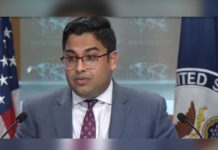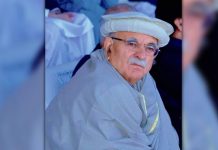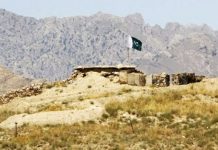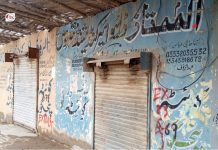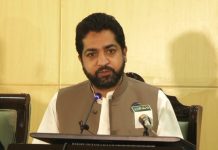An organization in Pakistan’s insurgency-wreaked regions says its preliminary lists have identified thousands of people who have disappeared over the past 15 years.
The Pashtun Tahafuz Movement (PTM) or Pashtun Protection Movement, is working with the families of those who have disappeared during more than 15 years of unrest in Pakistan’s northwestern Federally Administered Tribal Areas (FATA), Khyber Pakhtunkhwa Province, and parts of southwestern Balochistan Province. These regions are predominantly populated by ethnic Pashtuns, who comprise up to 20 percent of the country’s population.
Mohsin Dawar, a lawyer and senior figure in PTM, says more than 4,000 people remain unaccounted for on the lists.
“These lists are still a work in progress, but the names various individuals in our movement have received now exceed 4,000,” he told RFE/RL’s Gandhara website on February 26. “We expect to have a final list once we build a central database.”
Bilal Mehsud is in charge of collecting the raw data of names, places, occupations, and circumstances of how individuals disappeared. He says that based on their consultations, more than 8,000 Pashtuns remain untraceable.
“The data I have seen has more than 2,000 names, but we are constantly receiving more,” he told Radio Mashaal. Mehsud says volunteers collect the data in Pashtun communities spread over 1,000 kilometers along Pakistan’s western border with Afghanistan. Some victims were based in Karachi and other major Pakistani cities where large numbers of Pashtuns have fled since the onset of the Taliban and Al-Qaeda insurgency in their homeland in 2003.
He says the missing include victims of enforced disappearances — civilians detained by security forces without a trial — and many more who have been lost during the past 15 years of unrest.
“We want the victims of enforced disappearances to be released or presented before a court of law,” he said. “We also have victims whose families know nothing about them. We would like the authorities to establish their whereabouts so that their families can have closure.”
PTM emerged from a 10-day protest earlier this month in the Pakistani capital, Islamabad. The protest was prompted by the murder of a young Pashtun shopkeeper and aspiring model, Naqeebullah Mehsud. His killing in an alleged staged gunbattle with police galvanized Pashtuns, prompting thousands to protest an end to enforced disappearances, unlawful killings, racial profiling, discrimination and unexploded bombs littering their homeland.
Most of their grievances are rooted in 15 years of conflict. FATA became a front line in the global war on terrorism after the Taliban and allied groups retreated to the mountainous region following the demise of the Taliban’s hard-line regime in neighboring Afghanistan.
More than 60,000 civilians and soldiers died in the ensuing violence that began in 2003 in Waziristan and gradually engulfed all of FATA and parts of Khyber Pakhtunkhwa and Balochistan.
While the Pakistani government agreed to immediately address the issue of landmines and promised justice for Mehsud, its response to other issues such as enforced disappearances was muted.
“The prime minister also said that genuine grievances raised by Jirga members from different quarters will be addressed as soon as possible,” noted a February 6 government memo about a meeting between Pakistani Prime Minister Shahid Khaqan Abbasi and a delegation from the Pashtun protest.
The issue of disappeared persons is a sensitive one for the authorities. For years, families of alleged separatists, militants, activists, and dissidents have accused Pakistani security forces and secret services of abducting and detaining their loved ones.
The military and numerous Pakistan intelligence agencies, however, vehemently deny the enforced disappearances.
In 2011, the government established the Commission of Inquiry on Enforced Disappearances to investigate the issue. By late 2017, it claimed to have traced more than 2,000 people.
But lawmakers were not impressed. “Many of the so-called ‘recovered’ [people] were dead bodies. Did the commission initiate any investigation or prosecution against officials involved?” asked Senator Farhatullah Babar.
The commission’s website lists thousands of names of victims of enforced disappearances. The database has an update on their status and indicates whether someone has yet to be located, has returned home, or is under investigation.
Mehsud says that since the beginning of the protest more than 200 people have returned to their homes. Most were residents of South Waziristan, North Waziristan, and other districts in FATA.
PTM leader Manzoor Ahmad Pashteen says they are determined to find all of those who have disappeared.
“Thousands of Pashtuns are victims of enforced disappearance while thousands more have been killed unlawfully,” he said in a video posted on Facebook on February 26.
He urged communities from all Pashtun regions to help their organization in collecting details about the victims.
“We will then ask the state why they have failed to protect us,” he said.











